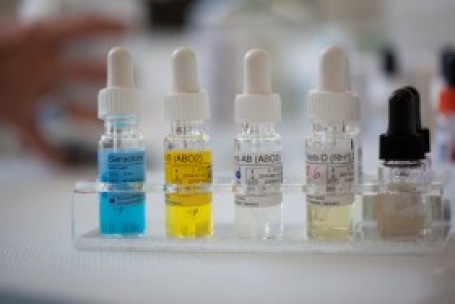Immunohematological tests enable safe blood transfusion and transplantation of haematopoietic tissue, as well as prevent undesired immune-related phenomena after transfusion, transplantation and during pregnancy. In other words, immunohematological tests can be grouped into pretransfusion tests (tests of patients' blood before they receive a certain blood component) and prenatal tests.

Pretransfusion tests include tests for determining compatibility between blood donors and patients in various blood cell antigenic systems (erythrocytes, platelet and leukocyte antigens). In cases where a blood transfusion is expected, the patient's ABO and Rh blood group must be determined and the so-called cross-match test has to be performed. This test prevents that undesired reactions after the transfusion due to erythrocyte antibodies would appear. Patients always receive the blood identical to their own ABO and Rh blood group; only exceptionally it is allowed to transfuse the blood of another blood group. Within the scope of the cross-match test, a certain percentage of patients are identified carrying unexpected erythrocyte antibodies, which dictates further immunohematology tests (so-called specification of erythrocyte antibodies). Based on the specificity of erythrocyte antibodies discovered, a patient is transfused with matching erythrocyte components. Certain groups of patients, such as patients with haemolytic anaemia, must undergo additional tests within the frame of making a diagnosis and achieving success in treatment (direct and indirect Coombs tests).

Prenatal tests are performed in order to identify incompatible erythrocyte antigens between the mother and foetus, which cause the so-called fetomaternal incompatibility, leading to a threat of hemolytic disease of the foetus and newborn. During pregnancy, every pregnant woman is tested by means of the Coombs test, ABO and Rh blood grouping, and infection markers testing. The purpose of these tests is to prevent the formation of pathological antibodies where possible. If antibodies are discovered, it is necessary to adequately manage the pregnancy and treat the pregnant woman. Within this scope, we provide prenatal protection (injecting Ig anti-D) for prevention of the haemolytic disease of the foetus and newborn, which is an ongoing prevention service within the prenatal protection programme. We also perform tests on pregnant women and newborns in relation to the transfusion, thereby ensuring the transfusion of compatible blood and blood components. Within the scope of the prenatal protection programme, we also provide counselling services and record-keeping, e.g. the National Registry of Immunised Women.
By performing immunohematological and immunogenetic tests, we participate in the preparation of patients for transplantation of individual organs and tissues.
Immunohaematology also covers the identification of platelet antibodies that occur as a result of the immune response to platelet antigens, thus leading to a decreased number of platelets. We identify platelet antibodies and determine the specificity of the antibodies present. The most frequently used methods are the platelet immunofluorescence test (PIFT), the enzyme-linked immunosorbent assay (ELISA) and the monoclonal antibody-specific immobilization of platelet antigens (MAIPA).